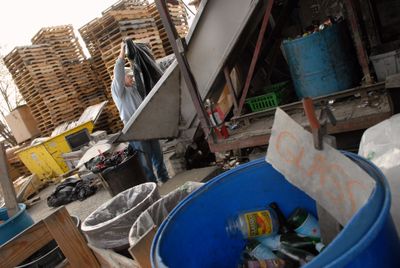Recyclers see rise in business
Economy’s downturn has more looking to cash in on trash

When the economy tanks, people start pawing through jewelry boxes, coin collections and storage sheds in search of stuff to sell. Lately, they’re looking to convert even their trash to cash.
“All recyclable materials are commodities, just like gold or silver or wheat,” said Suzanne Tresko, recycling coordinator for the Spokane Regional Solid Waste System. “We’ve heard from private recyclers in the area they’re seeing an increase in the number of people bringing in recyclables.”
More companies are counting on recycling to boost their bottom lines. The financial benefits are twofold: They make money unloading old inventory, and they save money because they don’t have to pay for it to be hauled to the dump.
Jim Schrock runs Earthworks Recycling in Spokane. Over the past 28 years, he’s nurtured it from a roving one-man newspaper and can collection service to a 15-employee operation that runs six days a week.
He’s seen several cycles of booms and busts. And when the economy goes south, “before they lay people off or cut hours, they’ll clean up their warehouses or back lots to either raise some cash or at least to keep the least expendable people around as long as they can,” he said.
“That’s what’s happening now,” Schrock said.
Earthworks completes about 2,000 transactions a month with walk-in customers, who constitute about two-thirds of its business.
Among them are electricians who’ve salvaged scrap metal that would otherwise end up in trash bins, families unloading stuff from their grandmas’ attics and transients who scrounge up bags of aluminum cans.
Rick Keller, general manager of Spokane Recycling Products, said he’s seen a jump in the number of offices “getting rid of their (paper) files and getting paid for them.”
And Pacific Steel & Recycling’s Spokane facility pays for high-quality scrap metals, general manager Doug Stewart said. Clients’ waste metals may net anything from “a couple hundred bucks a month to several hundred thousands a year.”
Wille Lampe, president of Spokane Recycling Inc., said he credits the number of summer “staycationers” for an unexpected business boon in July, normally a down month for curbside commodity collections.
He said the booty in this summer’s blue bins included “20 percent more plastic (drinking) bottles; aluminum was up … and even newspaper (collections) was pretty decent,” Lampe said.
Charities and schools have always been on the bandwagon.
Earthworks Recycling expects to write a $35,000 check to the Spokane Lions Club for newspapers collected in the group’s recycling kiosks, Schrock said.
Lampe said he has every reason to believe the trend will continue.
“I think we’re going to see more people coming in. The downturn in the economy will be driving more people that way,” he said.